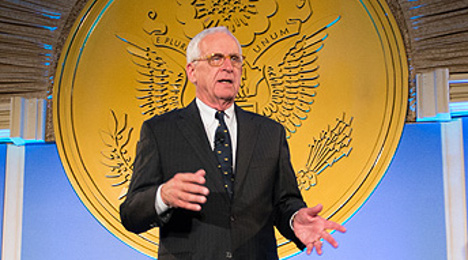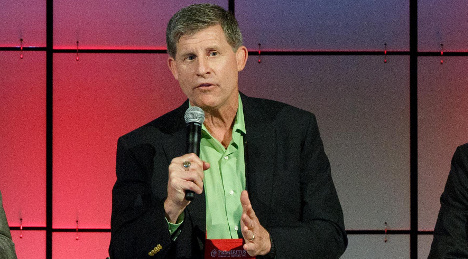For dealership principals and finance company executives who might be watching tonight’s fourth Republican presidential primary debate, they might not want to step away during a commercial break: an advertisement is planned to highlight the position against the Consumer Financial Protection Bureau.
The American Action Network (AAN) — an organization that says it creates, encourages and promotes center-right policies based on the principles of freedom, limited government, American exceptionalism and strong national security — is launching a $500,000 ad campaign against the CFPB.
AAN officials explained the national ad buy will run throughout this evening on Fox Business, the host of the fourth GOP primary debate.
Additionally, they indicated the ad campaign will air during the post-debate commentary on Fox News Channel tonight, on cable television in Washington, D.C., this week, and online the next four weeks along with the launch of StopCFPB.com.
In addition to raising national awareness, AAN president Mike Shields highlighted this ad campaign calls on Congress to stop the CFPB’s “flagrant overreach” into the finances of Americans.
The ad features both Sen. Elizabeth Warren and CFPB director Richard Cordray on red party banners and visualizes the consequences of CFPB’s “reckless regulations” issued under the guise of protecting consumers.
“It’s time to start a national conversation about the 500 major regulations issued under this administration, especially through the unaccountable CFPB,” Shields said.
“Elizabeth Warren’s CFPB is unilaterally handing down regulations that ultimately hurt the people they claim to be helping, particularly middle- and lower-income Americans trying to get ahead in a terrible economy,” Shields continued. “We want voters to know the truth about this rogue agency and to call on national leaders and Congress to stop the CFPB.”
For dealers and finance company managers who might not be able to watch tonight’s debate, AAN uploaded the spot to YouTube, and it can be watched in the panel at the top of this page.
For the second time in four months, the National Automobile Dealers Association has stated the Consumer Financial Protection Bureau squashed efforts to make public a number of leaked agency documents that NADA contends might undermine many of the agency’s long-running claims that it is not attempting to regulate dealers in circumvention of the Dodd-Frank Act.
NADA indicated the CFPB’s latest rejection came in response to an Oct. 8 Freedom of Information Act (FOIA) request, asking the CFPB to release internal documents, leaked to American Banker, acknowledging that the agency intended to regulate the auto finance market through enforcement action, and showing that it eschewed evidence that its methods for estimating disparate impact were deeply flawed.
In July, NADA asked the CFPB to make publically available documents — also leaked to American Banker — in which CFPB officials admitted in a private memo that they intended to eliminate the ability of dealers to offer discounted financing rates to consumers, despite the bureau's statutory prohibition against regulating dealers, as well as numerous public pronouncements from director Richard Cordray that the bureau was not — as both Republicans and Democrats in Congress have worried — straying from its Congressional mandate.
The CFPB denied NADA's July FOIA request three days after it was filed.
Officials pointed out the rejection of NADA’s latest request comes directly on the heels of a series of Wall Street Journal articles highlighting the significant shortcomings in the CFPB’s process of identifying minority borrowers. According to The Wall Street Journal, the CFPB's continued use of this flawed methodology has resulted in non-minority borrowers receiving settlement funds that were specifically earmarked for minority borrowers.
“CFPB actions in the auto finance market are costing consumers money, and may very well be hurting the very people the agency is trying to help,” NADA president Peter Welch said.
“Consumers deserve a transparent process that will allow their concerns to be heard and considered before their rights are taken away by an overzealous Washington regulator,” Welch added.
Concerns about the manner in which the CFPB has attempted to influence the auto finance market prompted the House Financial Services Committee to approve H.R. 1737, a bill to provide accountability and transparency to that process. The committee approved the bill with a strong bipartisan vote of 47-10, and currently 102 House Republicans and 65 House Democrats have co-sponsored the bill.
The Consumer Financial Protection Bureau pinched another player in the auto finance space over its debt collection practices.
On Wednesday, the CFPB filed an administrative order against Security National Automotive Acceptance Co. (SNAAC), a finance company specializing in loans to servicemembers, for engaging in illegal debt collection practices. Officials indicated the order requires the company to refund or credit about $2.28 million to servicemembers and other consumers who were allegedly harmed, and pay a penalty of $1 million.
The bureau added that separate court order bans SNAAC from using aggressive tactics, such as exaggeration, deception, and threats to contact commanding officers, to coerce servicemembers into making payments.
“Security National Automotive Acceptance Company must refund or credit its customers $2.28 million for coercing money out of them using illegal debt collection practices,” CFPB director Richard Cordray said. “Servicemembers should not be forced to pay because a debt collector used deceptive pressure tactics.”
In a statement to SubPrime Auto Finance News, SNAAC recapped that this agreement comes more than two years after the CFPB launched an inquiry. During the span, SNAAC insisted it fully cooperated with the agency’s process and voluntarily adjusted some of its policies and personnel to ensure the company continued to provide its customers with the best service possible.
Despite admitting no wrongdoing, SNAAC thought it best to settle with the CFPB at this time.
“We are agreeing to this settlement in an effort to move forward serving our customers in the respectful, honorable manner we have always done,” SNAAC said.
“Despite our strong disagreement with the CFPB’s complaint, the cost and distraction of continuing to fight this was simply not in the best interests of our customers, associates or shareholders,” the company continued. “It’s time to move on. We’re proud of the work that we’ve done for our customers over the past 25 years, many of whom would not have had access to the credit they and their families need.
“Every day we strive to treat our customers with the dignity and respect they deserve and we look forward to continuing in that tradition,” SNAAC went on to say.
Ohio-based SNAAC operates in more than two dozen states and specializes in lending to servicemembers. It lends money primarily to active duty and former military to buy used vehicles. The CFPB first sued SNAAC back in June after having already made an enforcement action against Westlake Financial Services earlier this month as well as against DriveTime Automotive Group last November.
The CFPB alleged that when consumers defaulted on their loans, SNAAC used aggressive collection tactics that took advantage of servicemembers’ special obligations to remain current on debts. The regulator noted both active duty and former servicemembers could encounter trouble with the company if they missed or were late on payments.
Once servicemembers defaulted, the bureau said they became subject to repeated threats to contact their chain of command. In many other instances, the CFPB claimed SNAAC exaggerated the consequences of not paying. Thousands of people were victims of the company’s aggressive tactics, according to the CFPB, which articulated a trio of other allegation against the company.
• Exaggerated potential disciplinary action that servicemembers would face: The CFPB alleged that SNAAC routinely exaggerated the potential impacts of a delinquency on servicemembers’ careers. The bureau claimed the company told customers that their failure to pay could result in action under the Uniform Code of Military Justice, as well as a number of other adverse career consequences, including demotion, loss of promotion, discharge, denial of re-enlistment, loss of security clearance, or reassignment. In fact, these consequences were extremely unlikely.
• Contacted and threatened to contact commanding officers to pressure servicemembers into repayment: The CFPB indicated SNAAC “buried a provision within the fine print of contracts” saying that it could contact commanding officers about servicemembers’ debts. The bureau added the company suggested that the servicemembers were in violation of military law and other regulations and threatened to notify their commanding officers about the purported violations.
• Falsely threatened to garnish servicemembers’ wages: Officials claimed SNAAC implied to consumers that it could immediately commence an involuntary allotment or wage garnishment. But officials explained such consequences could not or would not occur because, through the military pay system, involuntary allotments are only processed once a judgment by a court is obtained. The CFPB added that SNAAC would threaten to pursue an involuntary allotment before it had even determined whether the servicemember would be sued.
• Misled servicemembers about imminent legal action: In many instances, the bureau said SNAAC threatened to take legal action against customers when, in fact, it had not determined whether to take such action.
More details enforcement action
Pursuant to the Dodd-Frank Act, the CFPB has the authority to take action against institutions engaging in unfair, deceptive, or abusive practices.
Under the terms of the administrative order filed on Wednesday and the separate court order, SNAAC will be required to:
• Provide about $2.28 million to thousands of harmed servicemembers and other consumers: SNAAC must identify the affected consumers and provide credits or refunds. The amount that each consumer receives will correspond to the amount of debt they were allegedly unlawfully pressured into paying. The company must submit a written plan to the CFPB for approval detailing how the company will identify and provide relief to the thousands of affected consumers.
• End threats to contact commanding officers: SNAAC cannot contact or threaten to contact a servicemember’s chain of command in order to pressure the servicemember to pay, and it may not disclose a servicemember’s debt to a commanding officer or employer.
• End misstatements about potential disciplinary action: The company cannot tell servicemembers that their delinquency or default constitutes a violation of military law or regulation and that not paying could result in negative impacts on such things as their careers or security clearance.
• End false threats of legal action against a consumer: SNAAC cannot tell consumers that it is taking legal action unless it intends to take such action.
• End false threats of garnishing wages: The company cannot tell consumers it will garnish their wages unless it has a judgment from a court permitting such garnishment.
• Pay a civil monetary penalty of $1 million: SNAAC will pay $1 million to the CFPB’s Civil Penalty Fund.
As of Oct. 1, the Consumer Financial Protection Bureau reported that the agency has handled 726,000 complaints nationally.
Along with a closer look at complaints coming from Chicago, officials noted some of the highlights from the statistics in this month’s snapshot report released this week include:
• Complaint volume: For September, the most-complained-about financial product or service was debt collection, representing about 29 percent of complaints submitted. Of the 23,354 complaints handled in September, approximately 6,818 of them were about debt collection. The second most-complained-about consumer product was credit reporting, accounting for approximately 4,799 complaints. Overall, the CFPB saw a 9 percent reduction in complaint volume between August and September 2015.
• Product trends: In a year-to-year comparison, complaints about debt settlement, credit repair and check cashing showed the greatest percentage increase. Complaints about these products, which the Bureau classifies as “other financial services complaints,” rose 97 percent from the same time period last year.
• State information: Idaho showed the greatest complaint volume increases from the same time last year by a wide margin. The volume of complaints from Idaho rose by 59 percent, while the next largest complaint volume increase—Nebraska—rose by 44 percent.
• Most-complained-about companies: The top three companies about which the CFPB received the most complaints remain unchanged from last month’s report. From May through July, Equifax, Experian, and Bank of America were the three most-complained-about companies.
Geographic spotlight on Chicago
This month, the CFPB’s report spotlighted the Chicago metro area.
With a population of nearly 10 million residents residing in three states — Illinois, Indiana and Wisconsin — the bureau pointed out the Chicago metro area is the third largest in the country.
Of the 726,000 complaints received by the CFPB, 21,100 of them have come from consumers in the Chicago metro area. Findings from the Chicago complaints include:
• Mortgages are the most-complained-about product: Overall, mortgage-related complaints have been the most-complained-about product in the Chicago metro area. Of the 21,100 complaints submitted by consumers in the Chicago metro area, 27 percent have been related to mortgages.
• Chicago complaint volume and type mirrors national trends: Debt collection and credit reporting are the second and third most-complained-about financial products in the Chicago metro area, following mortgages. Those are also the top three most-complained-about products nationwide.
• Most-complained-about companies: Credit reporting companies TransUnion, Equifax, and Experian were the first, second, and fourth most-complained-about companies by Chicago-area consumers over a 12-month period. The third-most complained about company by Chicago-area consumers was JPMorgan Chase.
Creditors, servicers and collectors need to quickly re-evaluate their approach to how they interact with consumers in the wake of the Westlake Financial Services/Wilshire Consumer Credit consent decree with the Consumer Financial Protection Bureau. Much like DriveTime and other scary cases these past few years, this matter serves as another illustration of the acts and practices that will raise the ire of this regulatory juggernaut.
The amounts are staggering — $44.1 million in cash relief and balance reductions to the victims plus a $4.25 million civil penalty.
The numerous illegal and deceptive practices that resulted in these penalties are disturbing: using phony called ID, threatening investigation and criminal prosecution, misrepresenting of payment amounts necessary to release repossessed vehicles, and disclosing of borrowers loan information to employers, family and friends, just to name some.
It’s time for a paradigm shift. If the goal is to avoid overly aggressive collection tactics that will create legal headaches, then look for alternatives that will create better paying customers. This doesn’t just mean better underwriting. It means changing the relationship between company and customer.
Status quo
Too many companies are comfortable doing business the way it’s “always” been done and resist change. They see nothing wrong with payment books and a long line of customers looking to make payments every weekend. They cling to the notion that they “want to see the collateral,” even though they can’t name the last time they did anything more than take the payment at the window. They operate with a false sense of security and a strategy of “hope” rather than embrace the ample technology tools that can help drive the bottom line, provide a better customer experience, and keep the regulators at bay. It’s time to be aggressive and look for ways to create a compliant customer experience that provides more payment options and transparency and, as a result, less of an opportunity for conflict and escalation.
For example, there are still companies that don’t provide customers with the ability to pay online from a website. These folks are missing two important points: first, establishing an online payment portal adds to efficiency, reduces collector “talk time” which is expensive, and reduces the opportunity for customer conflict. Secondly, customers’ like having payment alternatives and, judging from the rapid growth in consumer acceptance of this method, seemingly prefer doing business at a distance instead of face to face.
The rise in IVR (interactive voice response) and payments by text are two additional technologies that customers like to use. Businesses should like them too because they free up valuable personnel time and assure consistent communications with customers. Using an IVR system not only frees up valuable personnel time, it allows consistent and transparent messaging while allowing your customers to pay or make payment arrangements. Texting is especially exciting because not only can businesses send payment reminders, they can actually offer “pay by text” products that allow customers the freedom to do business on their schedule, not just when the car lot or call center are open. As more people manage their lives on their cell phones, it will be important for the industry to keep up with this promising tool.
A different way
Setting up customers on automatic electronic payments is perhaps the most underutilized tool in the industry’s arsenal. In this method, customers provide their payment information ahead of time and agree that a set amount will be paid at regular intervals. While the extension of credit can’t be conditioned on signing up for electronic payments, customers can be incented with things like free oil changes and gift cards. The benefits are far reaching: collecting becomes more efficient because the payments are made automatically and the potential for conflict is reduced because human intervention is not involved.
Too many companies neglect to drive adoption of this tool because they are fearful of those customers that may cancel the automatic payments or some payments not being made because of insufficient funds. That is analogous to letting the bottom 10 percent of your customers ruin it for the other 90 percent and is being reactionary instead of pro-active. Find an effective way to drive your customers to electronic payments and you will reap the benefits.
What do all of these methods have in common? They increase efficiency while at the same time removing the possibility of human conflict, which is the fastest way to ruin a positive customer relationship. If the ugly disputes and customer confrontation are replaced with efficient technology, then the overall customer experience will be more positive, less resources will be spent on those customers, and more resources can be pointed in the direction of those most difficult customers that need the attention. Just be sure to point those resources in such a way as to avoid those activities the CFPB likes to attack.
Susan Perlmutter is chief revenue officer and Steve Levine is chief legal and compliance officer of Sigma Payment Solutions, a provider of payment technology products for creditors and other businesses. For more information, visit SigmaPayments.com.
The National Automobile Dealers Association is again trying to leverage the Freedom of Information Act (FOIA) to obtain sensitive Consumer Financial Protection Bureau material that made its way to the media.
This week, NADA asked the CFPB to release internal documents that the association says are acknowledging that the agency intended to regulate the auto finance market through enforcement action, and eschewed evidence that its methods for estimating disparate impact were deeply flawed.
The request was made under the FOIA and signed by NADA vice president of regulatory affairs Paul Metrey.
It is the second time in less than three months that NADA has requested access to agency documents that NADA claimed were leaked to American Banker. NADB contends the documents show a CFPB intent on eliminating the dealer discretion to offer discounted financing rates to consumers.
NADA's first request, filed on July 13, was denied by the CFPB three days later.
On Sept. 17 and Sept. 24, association officials recapped that American Banker published articles that made numerous references to internal CFPB documents revealing that the CFPB:
• Based its understanding of the vehicle financing marketplace and dealer compensation on a discredited advocacy report as opposed to a dispassionate and informed review of the market, data analysis, or an accurate assessment of consumer impact;
• Made a conscious decision to attempt to regulate the auto finance market through "market-tipping" enforcement actions as opposed to a transparent and informed rulemaking process; and
• Recognized that, despite knowledge that its disparate impact methodology could produce significant inaccuracies, persisted in using that flawed methodology to extract settlements from finance companies over which it has extraordinary leverage.
Several members of the U.S. House Financial Services Committee also referenced the American Banker reports when they questioned CFPB director Richard Cordray when he came to Capitol Hill to give the bureau’s semiannual report.
“These documents demonstrate a lack of transparency and accountability that should be deeply troubling to anyone concerned about how significantly a regulator can influence a market that affects millions of consumers,” NADA president Peter Welch said.
“Consumers benefit tremendously from the discounts they get from dealers, and they have every right to demand that their voices be included in — not willfully excluded from — the debate about how to regulate the auto finance market,” Welch went on to say.
The Consumer Financial Protection Bureau is now using the phrase “free pass” to describe how some finance companies include arbitration clauses in their vehicle installment contracts.
As a result, the CFPB announced on Wednesday that the agency is considering proposing rules that would ban consumer financial companies from using a “free pass” to block consumers from suing in groups to obtain relief.
The bureau published an outline of the proposals under consideration in preparation for convening a Small Business Review Panel to gather feedback from small industry stakeholders. Officials indicated this is the first step in the process of a potential rulemaking on this issue.
The proposals being considered would ban companies from including arbitration clauses that block class action lawsuits in their consumer contracts. This would apply to most consumer financial products and services that the CFPB oversees, including credit cards, checking and deposit accounts, prepaid cards, money transfer services, certain auto loans, auto title loans, small dollar or payday loans, private student loans and installment loans.
The CFPB pointed out its proposals being considered would not ban arbitration clauses in their entirety.
“However, the clauses would have to say explicitly that they do not apply to cases filed as class actions unless and until the class certification is denied by the court or the class claims are dismissed in court,” the CFPB said.
Officials added that proposals under consideration would also require that companies that choose to use arbitration clauses for individual disputes submit to the CFPB the arbitration claims filed and awards issued.
“This will allow the bureau to monitor consumer finance arbitrations to ensure that the process is fair for consumers,” the bureau said.
The CFPB also mentioned that it is considering publishing the claims and awards on its website so the public can monitor them.
CFPB director Richard Cordray explained that “buried” in many contracts, most arbitration clauses deny consumers the right to participate in group lawsuits against companies.
With this “free pass,” Cordray and the CFPB contend that companies can “sidestep” the legal system, avoid “big” refunds and continue to pursue “profitable” practices that may violate the law and “harm” countless consumers. The CFPB’s proposals under consideration would give consumers their day in court and deter companies from wrongdoing.
“Consumers should not be asked to sign away their legal rights when they open a bank account or credit card,” Cordray said. “Companies are using the arbitration clause as a free pass to sidestep the courts and avoid accountability for wrongdoing.
“The proposals under consideration would ban arbitration clauses that block group lawsuits so that consumers can take companies to court to seek the relief they deserve,” he went on to say.
The bureau acknowledged many contracts for consumer financial products and services include arbitration clauses. These clauses typically state that either the company or the consumer can require disputes about that product to be resolved by privately appointed individuals —arbitrators — rather than through the court system. Where such a clause exists, either side can generally block lawsuits from proceeding in court.
The CFPB contends these clauses also typically bar consumers from bringing group claims through the arbitration process.
“There are arbitration clauses in all kinds of consumer financial products, from bank accounts to private student loans,” bureau officials said. “They affect tens of millions of consumers. As a result, no matter how many consumers are injured by the same conduct, consumers must resolve their claims individually against the company, which few consumers do.”
In the Dodd-Frank Wall Street Reform and Consumer Protection Act, Congress required the CFPB to study the use of arbitration clauses in consumer financial markets and gave the bureau the power to issue regulations that are in the public interest, for the protection of consumers, and consistent with the study’s findings.
The CFPB’s study — released in March of this year — showed that arbitration clauses “restrict” consumers’ relief for disputes with financial service providers by allowing companies to block group lawsuits.
The study also found that, in the consumer finance markets studied, “very few” consumers individually seek relief through arbitration or the federal courts, while millions of consumers are eligible for relief each year through group settlements.
According to the study, more than 75 percent of consumers surveyed in the credit card market did not know whether they were subject to an arbitration clause in their contract. Fewer than 7 percent of those consumers covered by arbitration clauses realized that the clauses restricted their ability to sue in court.
Bureau’s three proposal benefits
Bureau officials outlined what they believe will be the three benefits of their arbitration proposals, including:
• A day in court for consumers: The proposals under consideration would give consumers their day in court to hold companies accountable for wrongdoing. Often the harm to an individual consumer may be too small to make it practical to pursue litigation, even where the overall harm to consumers is significant. Previous CFPB survey results reported that only around 2 percent of consumers surveyed would consult an attorney to pursue an individual lawsuit as a means of resolving a small-dollar dispute. In cases involving small injuries of anything less than a few thousand dollars, it can be difficult for a consumer to find a lawyer to handle their case. Congress and the courts developed class litigation procedures in part to address concerns like these. With group lawsuits, consumers have opportunities to obtain relief they otherwise might not get.
• Deterrent effect: The proposals under consideration would incentivize companies to comply with the law to avoid lawsuits. Arbitration clauses enable companies to avoid being held accountable for their conduct; that makes companies more likely to engage in conduct that could violate consumer protection laws or their contracts with customers. When companies can be called to account for their misconduct, public attention on the cases can affect or influence their individual business practices and the business practices of other companies more broadly.
• Increased transparency: The proposals under consideration would make the individual arbitration process more transparent by requiring companies that use arbitration clauses to submit the claims filed and awards issued in arbitration to the CFPB. This would enable the CFPB to better understand and monitor arbitration cases. The proposal under consideration to publish the claims filed and awards issued on the CFPB’s website would further increase transparency.
In addition to consulting with small business representatives, the bureau added that it will continue to seek input from the public, consumer groups, industry, and other stakeholders before continuing with the process of a rulemaking.
“When the bureau issues proposed regulations, the public is invited to submit written comments which will be carefully considered before final regulations are issued,” officials said.
The National Automobile Dealers Association chose an appropriate time to conduct its Washington Conference with all of the vehicle financing activity that percolated out of the nation’s capital last week.
More than 500 franchised dealers and dealer association executives from across the country traveled to Capitol Hill for NADA’s event to attend briefings and meet with members of Congress to discuss key policy issues, which include protecting consumer choice in auto financing and supporting legislation that boost consumer recall completion rates.
In remarks to conference attendees, NADA chairman Bill Fox stressed the importance of correcting misconceptions in the nation’s capital about the retail-auto industry.
“There’s a disturbing pattern of regulators wrapping ‘red tape’ around our industry and yet, they don’t fully understand it,” said Fox, a franchised dealer in the upstate New York cities of Auburn and Phoenix. “That’s why we need to keep working hard to get H.R. 1737 passed in the House, and explain that dealer-assisted financing is really a consumer issue.”
In July, the House Financial Services Committee passed NADA-backed H.R. 1737 by a bipartisan vote of 47-10 to rescind what the association called the Consumer Financial Protection Bureau’s “flawed” auto finance guidance that would limit or eliminate a customer’s ability to receive discounted auto loans at dealerships. This bill also calls for more transparency from the agency and a public notice and comment period when future auto lending guidance is issued.
NADA’s zeal to get the measure passed gained more steam as the CFPB made a pair of enforcement actions while dealers were in Washington, D.C. First, the CFPB ordered Fifth Third Bank to cap dealer markup at either 1.25 percent or 1 percent, depending on the length of the installment contract. Then, the bureau handed a penalty topping $44 million against Westlake Financial Services for infractions association with debt-collection practices.
Furthermore, the subject of auto financing was one of primary topics lawmakers asked CFPB Richard Cordray to address during his semiannual appearance in front of the House Financial Services Committee.
That same group of legislators also managed to push ahead a measure that likely will get cheers from NADA.
Bipartisan legislation sponsored by Rep. Steve Stivers, a Republican from Ohio, and Rep. Tim Walz, a Democrat from Minnesota, that would create the position of an independent inspector general (IG) at the CFPB passed out of committee.
“The CFPB has been given broad authority and must be accountable to the American people,” Stivers said. “More than 30 other federal departments and agencies have an independent inspector general. This bill would bring the CFPB in line with these agencies and provide the necessary oversight and transparency.”
The CFPB receives its operating funds from the Federal Reserve. Currently, the lawmakers indicated the bureau has very little Congressional oversight and does not have an independent inspector general solely dedicated to the agency. Instead, the CFPB shares an inspector general with the Federal Reserve, which is appointed by the Fed Chairman.
The bill sponsored by Stivers and Walz would amend the Inspector General Act of 1978 to establish an independent inspector general for the CFPB.
“The CFPB is an important agency that works to ensure that you, the consumer, are protected from things like predatory payday lenders, shoddy mortgage bankers and defective products. Their work is important, but that doesn’t mean that they don’t need oversight,” Walz said.
“I believe the appointment of an independent inspector general will only increase their ability to fulfill their important mission and I am pleased this legislation passed out of committee,” he went on to say.
Having passed the committee, H.R. 957, the Bureau of Consumer Financial Protection-Inspector General Reform Act of 2015, will soon head to the House floor.
Meanwhile, a week ago, dealers and state dealer groups made more than 300 congressional visits on Capitol Hill to increase bipartisan support for H.R. 1737. The bill currently has 147 cosponsors (86 Republicans and 61 Democrats). A full House vote is expected this fall.
Furthermore, concerning proposed bills on recalls, Wes Lutz, chairman of NADA’s Government Relations Committee, urged dealers to ask their members of Congress not to cosponsor H.R. 2198 and H.R. 1181, saying the legislation “misses the mark by requiring recalled vehicles be grounded instead of actually fixed.”
Lutz pointed out there are 46 million vehicles on the road today under open recall, but many of the defects have nothing to do with vehicle safety
“Imagine what would happen if dealers could only offer a fraction for customer trade-ins, or couldn’t accept them at all. This could be the reality if the Blumenthal amendment is passed,” said Lutz, a dealer in Jackson, Mich. “Dealers support a 100 percent recall completion rate. Congress should focus on legislation that helps increase recall completion rates.”
In developments that frustrated a trio of franchised dealer trade groups, it appears the Consumer Financial Protection Bureau strengthened two regulatory patterns when the agency released its enforcement action against Fifth Third Bank earlier this week.
To get some clarity about those trends as they relate to possibly pursuing litigation as well as capping dealer participation, SubPrime Auto Finance News again reached out to Michael Thurman, who spent more than 20 years of his nearly three-decade career at firms including Keesal, Young & Logan as well as Loeb & Loeb before opening his own firm.
“What I’m seeing is a pretty obvious pattern that the CFPB is going to work its way through the auto finance industry until everyone has either consented formally or informally to the terms that they’re imposing,” Thurman said during a phone conversation on Thursday. “It looks to me like they’re going to work their way through the industry until the limitations that they’ve set in their orders become basically the industry standard unless someone is willing to take them on in a litigated enforcement action.
“Obviously some of the bigger players have already reached resolutions,” he continued. “So if you’re a smaller player, you see that and you think to yourself, ‘If they’re not going to step up and fight this, it probably makes sense for us to take a similar approach as Fifth Third Bank and basically reach a cooperative resolution.’”
To recap as part of its $18 million penalty in the auto space, the CFPB and Department of Justice ordered Fifth Third Bank to substantially reduce or eliminate entirely dealer discretion. Fifth Third Bank will reduce dealer discretion to mark up the interest rate to only 1.25 percent above the buy rate for auto loans with terms of 5 years or less, and 1 percent for auto loans with longer terms. Fifth Third also has the option under the order to move to non-discretionary dealer compensation.
The mandates are quite similar to what regulators asked of American Honda Finance Corp. as part of an action detailed this summer.
The caps on dealer participation arrived as CFPB Richard Cordray touched on the practice when he appeared to give his semiannual report to the U.S. House Financial Services Committee this week. Cordray described the dealer participation as “a practice that we believe is discriminatory,” and caps being “a fair way to try to address the issue.”
Thurman tried to tackle questions as to why the CFPB seems so adamant about why discrimination happens during the markup process.
“My sense is that they’re really acknowledging that they don’t see any intentional discrimination on the part of the auto finance companies, and that they don’t necessarily see any internal procedural discrimination by auto finance companies,” he said. “Where they see the open hole where statistical discrimination can occur is by allowing the dealer to have significant discretion.
“What they’re really doing is saying, ‘We are going to impose restrictions on the amount of discretion a dealer can have which we believe will limit the amount of statistical discrimination that will result,’” Thurman went on to say.
Perhaps like many industry players, Thurman still questions how the CFPB arrives at any discrimination allegations at all since the bureau use the theory of disparate impact.
“From my perspective, I can’t lose track of the fact that this really is a set of cases based on alleged statistical discrimination,” Thurman said. “The CFPB is not claiming in any of these cases an intent on the part of either the part of the dealer or the finance company to raise rates on consumers of diverse minorities. But instead what they’re saying is that based on this analysis that they perform using ZIP codes and using racial profiles that come from the Census, they believe there is a high probability of statistical discrimination.”
Even with more than 30 years of legal experience, Thurman acknowledged that premise is difficult for any size auto finance company to formulate a defense.
“No one is saying you’re intentionally doing something wrong. No one even saying that there is hard data that shows actual discrimination is resulting because obviously there are people named Rodriguez who live in an area where the statistics say it’s likely you’re Hispanic, and yet ethnically they’re Caucasian, Asian or some other race,” Thurman said. “That’s the problem I have with this approach. It’s almost like a big data prosecution as opposed to an actual discriminatory conduct prosecution.
“That’s the world we obviously live in now. I think companies like Fifth Third Bank understand that. They recognize that the best way to resolve these is to cooperate and impose restrictions that the CFPB is requesting and move on with business,” he went on to say.
Dealers react strongly to Fifth Third Bank action
While perhaps Fifth Third Bank is moving on with its business, leaders of the three major franchised dealerships industry groups sharply criticized the settlement reached between the CFPB and the bank.
They claim dealers who work with Fifth Third Bank to help consumers obtain financing on new vehicles will now be significantly limited in their ability to get discounted rates at the dealership. As a result, the groups said consumers will lose as much as 1.25 percent of available savings on their loans.
"By cutting the discount zone so dramatically, the government has significantly reduced the amount of money consumers can save on auto financing at the dealership,” National Automobile Dealers Association chairman Bill Fox said. “Between 70 and 80 percent of new-car buyers rely on dealerships to help them find competitive financing, and the fact is that most consumers get a better rate at the dealership because of the rate discounts that are only available at the dealership.”
"Consumers have every right to continue benefiting from a system that saves them money every day, but bank-by-bank, percent-by-percent, the CFPB is taking those rights away, and without giving consumers any say in the matter," Fox added.
The groups claim this week’s enforcement action is “particularly egregious” given the recent publication of private documents in which top officials at the CFPB admitted that the methodology they use to bring these enforcement actions systematically overestimates potential disparities in interest rates paid by minority and non-minority borrowers.
According to American Banker, "in a series of private documents … CFPB officials repeatedly acknowledge its methodology could overcount the potential discrimination by firms, but say they prefer that to the alternative where bias is underestimated.”
In light of that revelation, Damon Lester, president of the National Association of Minority Automobile Dealers (NAMAD), referenced the Fair Credit Compliance Program developed by NADA, NAMAD, and the American International Automobile Dealers Association (AIADA), and modeled after a program originally implemented by the Civil Rights Division of the Department of Justice.
“We believe there is no room for discrimination in auto financing. That is why we strongly support the Fair Credit Compliance Program as viable solution to both protect consumers and provide fairness to dealers,” Lester said. “While we appreciate the CFPB's commitment to rooting out discrimination, our approach, originally recommended by the DOJ, will be much more effective than the arbitrary nature in which the CFPB is currently proceeding.”
AIADA Chairman Bradley Hoffman added his thoughts on the matter, as well.
“The CFPB’s approach, which unnecessarily hamstrings consumers, is truly regrettable given that a viable solution to fair credit risk that preserves dealer discounts has been in front of them the whole time,” Hoffman said. “An array of the industry’s leading compliance attorneys have said that the NADA/NAMAD/AIADA Fair Credit Compliance Program is the best way to address fair credit risk while also preserving the dealer discounts that save consumers money.
“Right now, the only reason we can’t have both is because of the CFPB, and I think consumers deserve better than what they're currently getting out of Washington, D.C.,” Hoffman went on to say.
Westlake Financial Services made public statements late Thursday after the Consumer Financial Protection Bureau penalized the subprime auto finance company and its auto title lending subsidiary Wilshire Consumer Credit for pressuring borrowers using what the regulator deemed to be illegal debt collection tactics.
First off, Westlake offered context of the matter that became public and included orders for the companies to overhaul their debt collection practices and to provide consumers $44.1 million in cash relief and balance reductions as well as pay a civil penalty of $4.25 million.
“Over the last 18 months, WFS has cooperated fully with the CFPB,” the company said. “The CFPB allegations relate to practices as far back as 2010 and to practices that were ceased long ago.”
Westlake indicated that the company consented to the issuance of the consent order “without admitting or denying any of the findings of fact or conclusions of law” and did so in order to avoid lengthy and costly litigation.
The company declared that it shares a “fundamental agreement” with the CFPB in the importance of treating consumers fairly, appropriately and respectfully in all phases of the auto financing experience.
Since 2010, Westlake pointed out that it has voluntarily taken a number of steps to enhance its operational compliance program and improve its compliance management system, including the hiring of a chief compliance officer with extensive experience using compliant debt collection practices.
“WFS is eager to become a leader in operational compliance best practices within the consumer financial services industry and looks forward to an ongoing positive working relationship with the CFPB and all of WFS’ other regulators,” company officials said.
“WFS will continue to fill niches for consumers who may not otherwise be able to receive a reasonably priced auto loan while continuing to deliver to our customers FICO scores that raise more than any other auto finance lender in the industry,” they continued.
“WFS takes its compliance obligations very seriously. We will continue to enhance all of our processes and procedures to ensure that we remain compliant and meet all of our regulatory and legal requirements,” the company went on to say.












